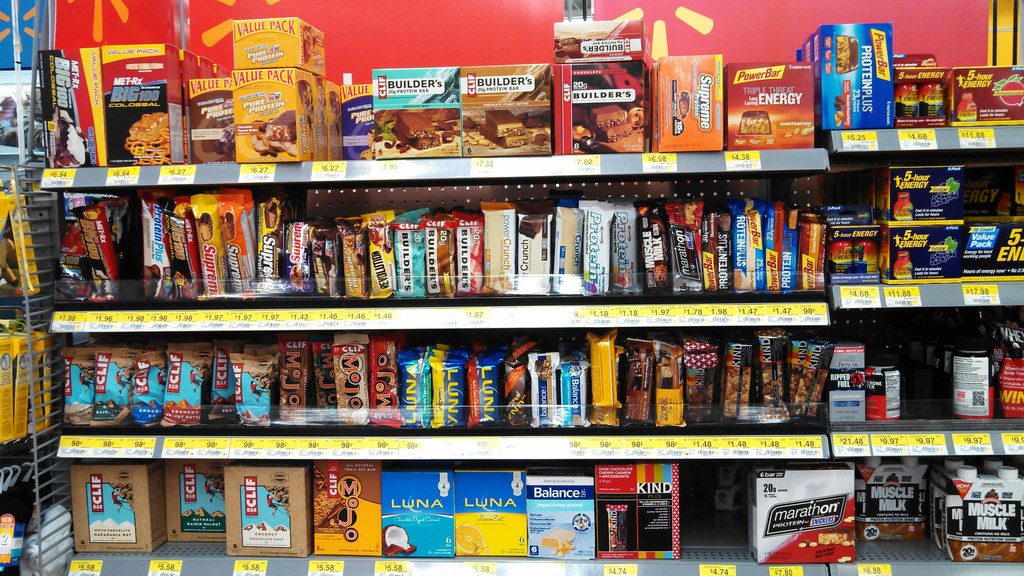The answer to whether protein bars are healthy is: it depends.
Protein bars are one of those go-to snacks. It’s easy to stock up on a few boxes of your favorite bar at the store, so you can throw one into your bag on your way out. But the problem is that many people assume that, since they’re protein bars, they’re all created equally as a healthy snack or meal replacement. This is not the case.
Check out the calories. Some protein bars can be as high as 400-some calories. That’s the caloric equivalent of a meal. Eating something that high in calories as a snack in addition to your meals will make it difficult for you to maintain your current weight or maintain a caloric deficit if you’re trying to lose weight. You could use a bar like this as a meal replacement, but you’d be better off putting those 400 calories toward chicken, fish, vegetables, and rice.
 If you’re just looking for a snack, a protein bar in the 100 – 250 calorie range is more ideal.
If you’re just looking for a snack, a protein bar in the 100 – 250 calorie range is more ideal.
Of course, it all depends. If you’re trying to gain weight, a higher calorie protein bar might be the way to go. A woman who needs fewer calories than a man might want to choose a snack protein bar that’s around 150 calories, whereas a man could get away with a higher-calorie bar. If you’re losing weight, then a lower-calorie protein bar that’s also low in fat and sugar is what you’ll want to look for.
Remember that you must eat everything in the proper moderation. Even a lower calorie protein bar can make you gain weight if you eat too many of them.
Choose a protein bar that isn’t candy. The sugar quantities in some protein bars can reach shocking levels. Some bars have sugar contents greater than some candy bars. Even if the bar seems like a good choice because it contains 20 grams of protein, a sugar content of 20 to 30 grams nullifies any health benefits.
You also have to look out for sugar alcohols, which can cause diarrhea, cramps, bloating, and gas in certain people.
Stay away from ingredients you don’t recognize. While you’re checking out the nutrition label for calories, sugar, and fat, look at the list of ingredients. If there are very long names of “food” ingredients that you don’t recognize and have trouble pronouncing, that’s not a good sign. Artificial sweeteners and other additives can confuse your body into storing fat. Plus, they could be linked to inflammation, cancer, or other health problems.
One ingredient you want to avoid is high-fructose corn syrup, which is linked to obesity, heart disease, and cancer, to name a few.
You want a protein bar containing whey, calcium caseinate, P-protein, brown rice, or hemp. These types of proteins are made up of high amounts of branched chain amino acids (leucine, isoleucine, and valine), which best promote muscle growth.
Apart from looking for a bar that has ingredients you recognize, another good rule to abide by is: the fewer ingredients, the better.
Popular Lower Calorie Protein Bars on BodyBuilding.com:
- MusclePharm Combat Crunch
- Quest Nutrition Quest Bars
- Optimum Nutrition Opti-Bar
- MET-Rx
- MuscleTech Mission1 Clean Protein Bar
- FitJoy
Summary
Protein bars aren’t bad or good across the board – it depends. Some can be the equivalent of a candy bar, while others could be a good diet supplement.
- You have to think about what you want to use the bar for: a snack or a meal replacement?
- Are you trying to lose weight, maintain your weight, or gain weight?
- Based on your answers to the above two questions, check for calories, then sugar and fat.
- Are there artificial sweeteners and additives in the list of ingredients? Is high-fructose corn syrup the first or second ingredient listed?


